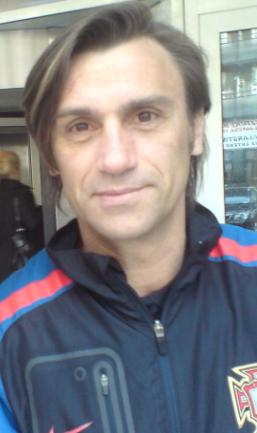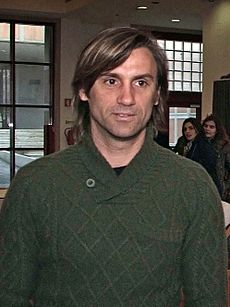João Pinto facts for kids

Pinto in 2013
|
|||||||||||||||||||||||||||||||||||||
| Personal information | |||||||||||||||||||||||||||||||||||||
|---|---|---|---|---|---|---|---|---|---|---|---|---|---|---|---|---|---|---|---|---|---|---|---|---|---|---|---|---|---|---|---|---|---|---|---|---|---|
| Full name | João Manuel Vieira Pinto | ||||||||||||||||||||||||||||||||||||
| Date of birth | 19 August 1971 | ||||||||||||||||||||||||||||||||||||
| Place of birth | Porto, Portugal | ||||||||||||||||||||||||||||||||||||
| Height | 1.71 m (5 ft 7 in) | ||||||||||||||||||||||||||||||||||||
| Position(s) | Forward | ||||||||||||||||||||||||||||||||||||
| Youth career | |||||||||||||||||||||||||||||||||||||
| Bairro do Falcão | |||||||||||||||||||||||||||||||||||||
| 1982–1983 | Águias da Areosa | ||||||||||||||||||||||||||||||||||||
| 1983–1988 | Boavista | ||||||||||||||||||||||||||||||||||||
| Senior career* | |||||||||||||||||||||||||||||||||||||
| Years | Team | Apps | (Gls) | ||||||||||||||||||||||||||||||||||
| 1988–1989 | Boavista | 17 | (3) | ||||||||||||||||||||||||||||||||||
| 1990–1991 | Atlético Madrileño | 30 | (9) | ||||||||||||||||||||||||||||||||||
| 1991–1992 | Boavista | 34 | (8) | ||||||||||||||||||||||||||||||||||
| 1992–2000 | Benfica | 220 | (64) | ||||||||||||||||||||||||||||||||||
| 2000–2004 | Sporting CP | 115 | (28) | ||||||||||||||||||||||||||||||||||
| 2004–2006 | Boavista | 57 | (11) | ||||||||||||||||||||||||||||||||||
| 2006–2008 | Braga | 33 | (3) | ||||||||||||||||||||||||||||||||||
| Total | 506 | (126) | |||||||||||||||||||||||||||||||||||
| International career | |||||||||||||||||||||||||||||||||||||
| 1987–1988 | Portugal U16 | 15 | (5) | ||||||||||||||||||||||||||||||||||
| 1988–1989 | Portugal U18 | 22 | (11) | ||||||||||||||||||||||||||||||||||
| 1989–1991 | Portugal U20 | 18 | (3) | ||||||||||||||||||||||||||||||||||
| 1991–1994 | Portugal U21 | 15 | (3) | ||||||||||||||||||||||||||||||||||
| 1991–2002 | Portugal | 81 | (23) | ||||||||||||||||||||||||||||||||||
|
Medal record
|
|||||||||||||||||||||||||||||||||||||
| *Club domestic league appearances and goals | |||||||||||||||||||||||||||||||||||||
João Manuel Vieira Pinto (born 19 August 1971) is a retired Portuguese footballer. He mostly played as a forward.
João Pinto was known for his amazing skills. He could create goals and score them too. He became famous playing for clubs in Portugal. He was also a very important player for the Portuguese national team. He was part of the "Golden Generation" of Portuguese football.
He played 151 games for Portugal at all levels, scoring 45 goals. For the senior team alone, he played 81 games and scored 23 goals. He represented his country in the 2002 World Cup and two European Championships.
At the club level, Pinto started his career with Boavista. He is best known for playing with two of Portugal's biggest clubs: Benfica and Sporting CP. He won one Primeira Liga title with each club. Overall, he won six major titles. In 19 seasons in the top league, he played 476 matches and scored 117 goals.
Contents
João Pinto's Football Journey
João Pinto started playing football in his hometown of Porto. He joined the Boavista F.C. academy when he was 12. Even at a young age, he was very fast and great at controlling the ball.
He was a bright star in Portugal's youth teams. He helped Portugal win the FIFA U-20 World Cup twice. This is a big achievement, as only a few players have won this competition twice. He made his debut in Portugal's top league at just 17 years old.
Early Career and First Trophies
After his great performance in the youth World Cup, Pinto moved to Atlético Madrid in 1990. He played for their reserve team. After one season, he returned to Boavista. He played in every match and scored eight goals. He also helped Boavista win the Taça de Portugal, a major cup competition. Soon after, he joined S.L. Benfica.
While at Benfica, João Pinto faced a health challenge in 1992. He had a collapsed lung during a game for Portugal. He recovered and continued his career. The next season, he played some of his best football. He scored three goals in a famous game against Sporting CP, helping Benfica win 6–3. This win was key to Benfica winning the 1994 national championship.
The Golden Boy and Sporting CP
João Pinto was nicknamed "The Golden Boy." He became the team captain for Benfica in 1995. However, the team did not win another national title during his time as captain.
Before the UEFA Euro 2000 tournament, he left Benfica. He was a free agent during the competition. He helped the national team reach the semi-finals. He scored eight goals during the qualifying games. In the tournament, he scored a header against England in a 3–2 comeback win. He also played in the Euro 1996 tournament.
After Euro 2000, Pinto signed a four-year deal with Sporting CP. After a quiet first season, Sporting signed Mário Jardel, a top goal scorer. Pinto then returned to his best form. He helped Sporting win his second league title in the 2001–02 season. Jardel even called him the "father of the team."
Challenges and Retirement
While very talented, João Pinto also had some tough moments on the field. He was sometimes involved in arguments with other players. He had a long-standing rivalry with Porto player Paulinho Santos.
A difficult moment happened during the 2002 World Cup. He was sent off in a game against South Korea. He was later suspended for six months because of this incident.
After the World Cup incident, Pinto's performance was not the same. Sporting did not finish in the top two spots in the league. In 2004, he left Sporting and returned to Boavista. He had a strong second season with Boavista, scoring nine league goals.
In 2006, Pinto joined S.C. Braga. He played two seasons there before retiring in 2008 at age 36. After retiring, João Pinto started working with the Portuguese Football Federation. He took on leadership roles.
Personal Life
João Pinto had two children from his first marriage. His older son, Tiago, also became a professional footballer. In 2008, João Pinto married television presenter Marisa Cruz. They divorced five years later.
João Pinto's younger brother, Sérgio, also played football. He mostly played in lower leagues in Portugal.
Achievements and Awards
João Pinto won many titles and awards during his career.
Boavista
- Taça de Portugal: 1991–92
Benfica
- Primeira Liga: 1993–94
- Taça de Portugal: 1992–93, 1995–96
Sporting CP
- Primeira Liga: 2001–02
- Taça de Portugal: 2001–02
- Supertaça Cândido de Oliveira: 2000
Portugal National Team
- FIFA U-20 World Cup: 1989, 1991 (Winner)
- UEFA European Under-21 Championship runner-up: 1994
- UEFA European Under-18 Championship runner-up: 1988, 1990
- UEFA European Under-16 Championship runner-up: 1988
Individual Awards
- CNID Footballer of the Year: 1992, 1993, 1994
- Portuguese Golden Ball: 1993, 1996
- SJPF Player of the Month: February 2006
See also
 In Spanish: João Pinto para niños
In Spanish: João Pinto para niños
- List of association football families
 | Emma Amos |
 | Edward Mitchell Bannister |
 | Larry D. Alexander |
 | Ernie Barnes |


